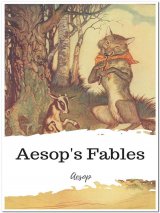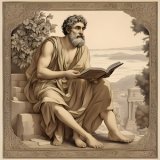Aesop's Fables Page #24
Aesop's Fables, or the Aesopica, is a collection of fables credited to Aesop, a slave and storyteller believed to have lived in ancient Greece between 620 and 564 BCE.
THE SWAN The Swan is said to sing but once in its life--when it knows that it is about to die. A certain man, who had heard of the song of the Swan, one day saw one of these birds for sale in the market, and bought it and took it home with him. A few days later he had some friends to dinner, and produced the Swan, and bade it sing for their entertainment: but the Swan remained silent. In course of time, when it was growing old, it became aware of its approaching end and broke into a sweet, sad song. When its owner heard it, he said angrily, "If the creature only sings when it is about to die, what a fool I was that day I wanted to hear its song! I ought to have wrung its neck instead of merely inviting it to sing." THE SNAKE AND JUPITER A Snake suffered a good deal from being constantly trodden upon by man and beast, owing partly to the length of his body and partly to his being unable to raise himself above the surface of the ground: so he went and complained to Jupiter about the risks to which he was exposed. But Jupiter had little sympathy for him. "I dare say," said he, "that if you had bitten the first that trod on you, the others would have taken more trouble to look where they put their feet." THE WOLF AND HIS SHADOW A Wolf, who was roaming about on the plain when the sun was getting low in the sky, was much impressed by the size of his shadow, and said to himself, "I had no idea I was so big. Fancy my being afraid of a lion! Why, I, not he, ought to be King of the beasts"; and, heedless of danger, he strutted about as if there could be no doubt at all about it. Just then a lion sprang upon him and began to devour him. "Alas," he cried, "had I not lost sight of the facts, I shouldn't have been ruined by my fancies." THE PLOUGHMAN AND THE WOLF A Ploughman loosed his oxen from the plough, and led them away to the water to drink. While he was absent a half-starved Wolf appeared on the scene, and went up to the plough and began chewing the leather straps attached to the yoke. As he gnawed away desperately in the hope of satisfying his craving for food, he somehow got entangled in the harness, and, taking fright, struggled to get free, tugging at the traces as if he would drag the plough along with him. Just then the Ploughman came back, and seeing what was happening, he cried, "Ah, you old rascal, I wish you would give up thieving for good and take to honest work instead." MERCURY AND THE MAN BITTEN BY AN ANT A Man once saw a ship go down with all its crew, and commented severely on the injustice of the gods. "They care nothing for a man's character," said he, "but let the good and the bad go to their deaths together." There was an ant-heap close by where he was standing, and, just as he spoke, he was bitten in the foot by an Ant. Turning in a temper to the ant-heap he stamped upon it and crushed hundreds of unoffending ants. Suddenly Mercury appeared, and belaboured him with his staff, saying as he did so, "You villain, where's your nice sense of justice now?" THE WILY LION A Lion watched a fat Bull feeding in a meadow, and his mouth watered when he thought of the royal feast he would make, but he did not dare to attack him, for he was afraid of his sharp horns. Hunger, however, presently compelled him to do something: and as the use of force did not promise success, he determined to resort to artifice. Going up to the Bull in friendly fashion, he said to him, "I cannot help saying how much I admire your magnificent figure. What a fine head! What powerful shoulders and thighs! But, my dear friend, what in the world makes you wear those ugly horns? You must find them as awkward as they are unsightly. Believe me, you would do much better without them." The Bull was foolish enough to be persuaded by this flattery to have his horns cut off; and, having now lost his only means of defence, fell an easy prey to the Lion. THE PARROT AND THE CAT A Man once bought a Parrot and gave it the run of his house. It revelled in its liberty, and presently flew up on to the mantelpiece and screamed away to its heart's content. The noise disturbed the Cat, who was asleep on the hearthrug. Looking up at the intruder, she said, "Who may you be, and where have you come from?" The Parrot replied, "Your master has just bought me and brought me home with him." "You impudent bird," said the Cat, "how dare you, a newcomer, make a noise like that? Why, I was born here, and have lived here all my life, and yet, if I venture to mew, they throw things at me and chase me all over the place." "Look here, mistress," said the Parrot, "you just hold your tongue. My voice they delight in; but yours--yours is a perfect nuisance." THE STAG AND THE LION A Stag was chased by the hounds, and took refuge in a cave, where he hoped to be safe from his pursuers. Unfortunately the cave contained a Lion, to whom he fell an easy prey. "Unhappy that I am," he cried, "I am saved from the power of the dogs only to fall into the clutches of a Lion." Out of the frying-pan into the fire. THE IMPOSTOR A certain man fell ill, and, being in a very bad way, he made a vow that he would sacrifice a hundred oxen to the gods if they would grant him a return to health. Wishing to see how he would keep his vow, they caused him to recover in a short time. Now, he hadn't an ox in the world, so he made a hundred little oxen out of tallow and offered them up on an altar, at the same time saying, "Ye gods, I call you to witness that I have discharged my vow." The gods determined to be even with him, so they sent him a dream, in which he was bidden to go to the sea-shore and fetch a hundred crowns which he was to find there. Hastening in great excitement to the shore, he fell in with a band of robbers, who seized him and carried him off to sell as a slave: and when they sold him a hundred crowns was the sum he fetched. Do not promise more than you can perform. THE DOGS AND THE HIDES Once upon a time a number of Dogs, who were famished with hunger, saw some Hides steeping in a river, but couldn't get at them because the water was too deep. So they put their heads together, and decided to drink away at the river till it was shallow enough for them to reach the Hides. But long before that happened they burst themselves with drinking. THE LION, THE FOX, AND THE ASS A Lion, a Fox, and an Ass went out hunting together. They had soon taken a large booty, which the Lion requested the Ass to divide between them. The Ass divided it all into three equal parts, and modestly begged the others to take their choice; at which the Lion, bursting with fury, sprang upon the Ass and tore him to pieces. Then, glaring at the Fox, he bade him make a fresh division. The Fox gathered almost the whole in one great heap for the Lion's share, leaving only the smallest possible morsel for himself. "My dear friend," said the Lion, "how did you get the knack of it so well?" The Fox replied, "Me? Oh, I took a lesson from the Ass."
Translation
Translate and read this book in other languages:
Select another language:
- - Select -
- 简体中文 (Chinese - Simplified)
- 繁體中文 (Chinese - Traditional)
- Español (Spanish)
- Esperanto (Esperanto)
- 日本語 (Japanese)
- Português (Portuguese)
- Deutsch (German)
- العربية (Arabic)
- Français (French)
- Русский (Russian)
- ಕನ್ನಡ (Kannada)
- 한국어 (Korean)
- עברית (Hebrew)
- Gaeilge (Irish)
- Українська (Ukrainian)
- اردو (Urdu)
- Magyar (Hungarian)
- मानक हिन्दी (Hindi)
- Indonesia (Indonesian)
- Italiano (Italian)
- தமிழ் (Tamil)
- Türkçe (Turkish)
- తెలుగు (Telugu)
- ภาษาไทย (Thai)
- Tiếng Việt (Vietnamese)
- Čeština (Czech)
- Polski (Polish)
- Bahasa Indonesia (Indonesian)
- Românește (Romanian)
- Nederlands (Dutch)
- Ελληνικά (Greek)
- Latinum (Latin)
- Svenska (Swedish)
- Dansk (Danish)
- Suomi (Finnish)
- فارسی (Persian)
- ייִדיש (Yiddish)
- հայերեն (Armenian)
- Norsk (Norwegian)
- English (English)
Citation
Use the citation below to add this book to your bibliography:
Style:MLAChicagoAPA
"Aesop's Fables Books." Literature.com. STANDS4 LLC, 2025. Web. 6 Mar. 2025. <https://www.literature.com/book/aesops_fables_316>.








Discuss this Aesop's Fables book with the community:
Report Comment
We're doing our best to make sure our content is useful, accurate and safe.
If by any chance you spot an inappropriate comment while navigating through our website please use this form to let us know, and we'll take care of it shortly.
Attachment
You need to be logged in to favorite.
Log In